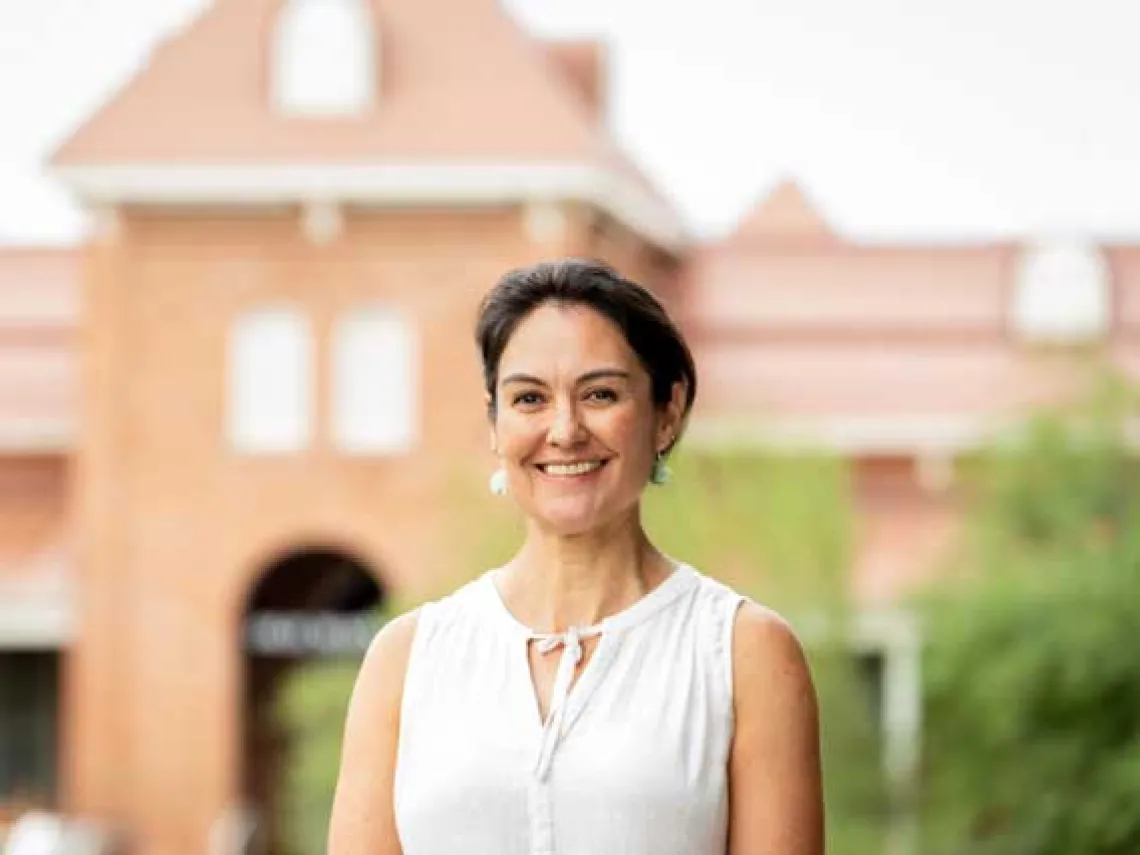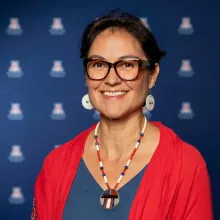FLINN SCHOLAR AND UARIZONA HONORS ALUMNA HELPS STUDENTS FIND THEIR VOICE

Shelly Lowe is a proud UArizona Honors Alumna and Flinn Scholar and is passionate about supporting Native and Indigenous students.

UAZ Honors Alumna and first Native American Flinn Scholar, Dr. Shelly Lowe '97 '05.
Tell us about yourself:
I grew up on the Navajo Reservation in Ganado, Arizona. I came to the University of Arizona as a Flinn Scholar and lived in Yavapai Hall my freshman year. I spent 15 years at UAZ earning my BA in Sociology, an MA in American Indian Studies, and completed my doctoral coursework in Higher Education while working as a Graduate Education Program Facilitator for the American Indian Studies Programs. I left Arizona in 2007 for a position as the Assistant Dean for Native American Affairs at Yale University and transitioned to my current position at Harvard as the Executive Director of the Harvard Native American Program (HUNAP) in 2009. in 2009. Four of my five children grew up in and around the UAZ campus, but I haven’t yet convinced any of them to become a Wildcat like their mom. I’m hoping graduate school at UAZ might entice one of them.
You were the first Native American selected as a Flinn Scholar. In what ways did receiving this scholarship impact your life?
Being a Flinn Scholar introduced me to a support system at UAZ and beyond. It connected me to the Honors College which made my experience at the university feel more personal and not like I was just one of thousands of students. It also introduced me to programming I would not have sought out on my own (like attending shows at Centennial Hall or visiting museums), and it helped me understand what it meant to be and the importance of being an Arizona resident (all the news, radio, and information in my community on the Navajo Reservation came from New Mexico).
In what ways has your Honors experience had an impact on your career path and who you are today? Who or what inspired you most?
Dr. Richard Kissling was an amazing support during my undergraduate years. His office was so welcoming, and he always took time to chat with students about everything and anything that might be going on. Dr. Patricia MacCorquodale, who was the Dean of the Honors College at that time was also inspiring. She was a great role model, and I knew after my freshman year that I wanted a career in high education. All the Honors faculty and staff at Slonaker House made you feel at home. It was a little oasis on a large densely populated campus. Being an Honors student and then serving on the advisory board helped prepare me for the work I do now with amazingly talented and focused students.
As the Executive Director of the Native American Program at Harvard University, what are you most passionate about in your work? What are some of the biggest challenges?
I’ll start with the biggest challenge which is being confronted regularly with the lack of information many people in this country have about Native Americans. This is not specific to the New England region as students and other affiliates come to Cambridge, Massachusetts from all over the country and world. It’s always shocking to have someone tell me they didn’t know Native Americans still exist in this country. It tells me a lot about the educational curriculum in this country and the ongoing erasure of Native American people in that curriculum.
I am most passionate about supporting the Native and Indigenous students who come to Harvard and other institutions in the Boston area (who often seek out the HUNAP office as a support network and space because there is no equivalent at their own institution). These students come and I almost always get to meet their family members or community members who are supporting them and are so excited that they are attending Harvard. Each of the students who get involved with HUNAP has a desire to give back to their community or the larger Native and Indigenous community upon graduation. Every year, graduations are momentous events that celebrate the realization of so many tribal community’s desires for educated tribal members. It’s so powerful. I am enriched by the diversity of our students and have had so many opportunities to learn about Native and Indigenous cultures nationally as well as globally.
What advice do you have for students (including Native and other underrepresented students) who wish to attend college on how to best navigate that journey?
First, go to class every day. It’s amazing how much information you miss out on by missing just one day of class. Second, sit in the front row of every class; you must pay attention more when you are front and center. Third, be sure to introduce yourself to your instructors by going to office hours the first week or two of classes. Native and other underrepresented students can too easily get lost in the student population shuffle and too often fall into the cracks and don’t get the support they need and should be getting. If your instructor knows who you are, knows your identity, and sees you every class period, you are less likely to fall behind or be invisible. Sometimes it’s nice to quietly go about your classes and keep to yourself, but it’s easier to be successful when you are seen and known. It also gives others the opportunity to be aware of the presence of Native and other underrepresented students. And, don’t be afraid to refuse to speak for “all Natives.” You can only be an expert of your own experiences, but you’ll be asked to speak for all others “like you,” especially when you are the only Native, Indigenous, or underrepresented student in class.
As a proud UAZ Honors Alumni, what were some of your favorite college memories? Is there anything you miss about Tucson?
Being a Flinn Scholar, I had the opportunity to attend various group events at Centennial Hall on campus. I then realized I could purchase student priced tickets for shows. One evening, I sat four rows back from the stage for a performance of Miss Saigon. It was the best theater experience I’ve ever had. It felt like I was part of the on-stage performance, and I only paid a ridiculously low student ticket price. I credit Centennial Hall (and the Flinn Scholar program) for introducing me to live theater.
In my senior year, we won the NCAA Men’s Basketball Championship. That was a very exciting year. I had been in some classes with a few of the players and it was fun to see them both in and out of the classroom and to see how they brought the entire campus together. The energy on campus was high and everyone, no matter where you came from, was part of one large Wildcat family. I’m still waiting for another championship win.
I’m thankful for being part of the UAAA Governing Board which means I will get to come to Tucson more often. I very much miss the sunsets and taking long jogs along the Rillito River.
Any words of wisdom for young alumni who are just starting out in their careers?
I strongly recommend connecting with your local UAZ alumni chapter or club. There are some great networking opportunities that are extremely helpful when starting out in your career. There are also avenues to encourage your local alumni chapter to offer professional development and networking events. I thankfully found and connected with my local alumni chapter (the BeantownCats, formerly the New England Cats) and we’ve been able to connect young alumni who are new to the Boston area to job opportunities, housing, and recommendations for fun things to do in the area. It’s been very nice knowing there are other Wildcats locally to connect to and socialize with.
Shelly C. Lowe is a citizen of the Navajo Nation and grew up on the Navajo Reservation in Ganado, Arizona. She is currently the Executive Director of the Harvard University Native American Program and was previously the Assistant Dean for Native American Affairs in the Yale College Deans Office and Director of the Native American Cultural Center at Yale University. Prior to her position at Yale, she spent six years as the Graduate Education Program Facilitator for the American Indian Studies Programs at The University of Arizona. Ms. Lowe is currently a member of the National Endowment for the Humanities Council, an appointment she received from President Obama. Most recently she became a member of the Governing Board for the University of Arizona Alumni Association. She has served on the board of the National Indian Education Association and as a member of the Board of Trustees for the National Museum of the American Indian.

